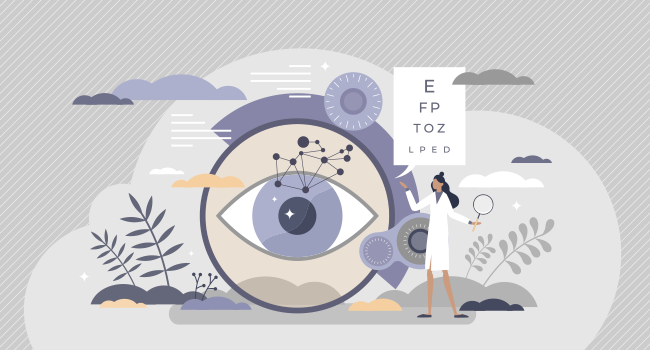
Retinitis pigmentosa (RP) is a hereditary retinal disease, frequently identified in childhood or adolescence and results in a gradual deterioration of night and peripheral vision. The illness often results in legal and occasionally total blindness.
What Exactly Is This Retinitis Pigmentosa?
A collection of related eye conditions known as retinitis pigmentosa result in progressive vision loss. The retina, a covering of light-sensitive tissue in the back of the eye, is impacted by several diseases. Vision loss happens in retinitis pigmentosa patients as the retina’s light-sensing cells gradually degenerate.
The loss of night vision, which usually manifests in infancy, is the earliest indication of retinitis pigmentosa. It may be challenging to manoeuvre in low light if you have night vision issues. Later, the condition results in blind spots in the peripheral (side) vision. These blind areas eventually converge to create tunnel vision.
What Are The Symptoms Of Retinitis Pigmentosa?
In the majority of types of Retinitis Pigmentosa, rods are impacted first. The degeneration of rods impacts peripheral and night sight because they are localized in the outside regions of the retina and are triggered by dim light. Over time, vision gets increasingly limited. Visual acuity, colour perception, and central vision are compromised if and when the condition worsens, and the cones are impacted.
One of the primary and most prevalent signs is Retinitis Pigmentosa night blindness. However, those with predominantly cone degeneration first notice a decline in their central vision and a loss of their capacity to distinguish colours and discern fine details.
Children, teenagers, and young adults generally get Retinitis Pigmentosa diagnosis reports positive. The problem worsens over time. Each person experiences visual loss at a different rate and to another degree. Many Retinitis Pigmentosa patients have central vision fields that are less than 20 ° in diameter at age 40, rendering them legally blind.
What Causes Retinitis Pigmentosa?
Retinitis Pigmentosa is frequently brought on by gene alterations that govern the retinal cells. Parents pass on these altered genes to their offspring.
Numerous genes have been associated with retinal pigmentation, which can be acquired in various ways. If you have Retinitis Pigmentosa, you can learn more about your risk of transmitting the disease to your offspring by speaking with your doctor or an expert known as a genetic counsellor.
Retinitis Pigmentosa can occasionally occur with other hereditary disorders, such as Usher syndrome. Loss of hearing and vision are both effects of Usher syndrome. Although these reasons are less frequent, retinitis pigmentosa causes can include certain medications, infections, or eye injuries.
How Do You Get Your Eyes Checked For Retinitis Pigmentosa?
Eye professionals can examine Retinitis Pigmentosa as part of a thorough dilated eye exam. The examination is quick and painless; after giving you eye medications to expand your pupil, the doctor will examine your eyes for Retinitis Pigmentosa and other eye issues. A visual field test is part of the examination to assess side vision.
Additional Retinitis Pigmentosa tests include:
Electroretinography (ERG):
The eye doctor can assess how well your retina reacts to light using ERG.
Optically guided radiation therapy (OCT):
In this examination, light waves are used to create a detailed image of your retina.
Imaging using fundus autofluorescence (FAF):
The retina is photographed by the Retinitis Pigmentosa specialist during this examination using blue light.
Genetic analysis:
In order to find out more about the variety of Retinitis Pigmentosa you have, your doctor might recommend a genetic test. You can learn how your Retinitis Pigmentosa symptoms might alter over time.
Is There Any Retina Treatment For Retinitis Pigmentosa?
Although there is no known Retinitis Pigmentosa treatment, vision impairment aids and training programmes can help patients make the most of their eyesight.
You can also discuss multivitamins for Retinitis Pigmentosa with your doctor. The common kinds of Retinitis Pigmentosa may cause vision loss, which vitamin A may help prevent. However, taking too much vitamin A can result in liver issues, so discuss the advantages and disadvantages of this medication with your doctor. Supplements including lutein and fish oil may also reduce the loss of vision.
However, getting routine eye exams is crucial for those with Retinitis Pigmentosa. The eye doctor can then keep track of signs and assist in determining the best therapies.
You can maximize your eyesight with the aid of tools and devices, and rehabilitation services can help you maintain your independence.
Other eye issues, such as the following, are more prevalent in people with RP:
- Refractive mistakes
- Cataracts
- Small pockets of fluid are present in the retina’s middle (cystoid macular oedema)
Your eye doctor can identify and address these issues at the early stage of Retinitis Pigmentosa with routine eye exams. This will enable you to maximize your vision.
Why CFS?
Although this disease is quite common in people nowadays, you should never take them lightly as it can become grave if not treated well on time. So, it is a good idea to go through a treatment at the appropriate time and consult a professional at CFS. We have a group of eye professionals who will provide you with the best experience. We have been there in the industry for a long time now and have successfully provided a huge number of patients with comfortable and effective surgery.
Article: What happens when you have Retinitis Pigmentosa?
Author: CFS Editorial Team | July 19 2022 | UPDATED 02:40 IST
*The views expressed here are solely those of the author in his private capacity and do not in any way represent the views of Centre for Sight.
